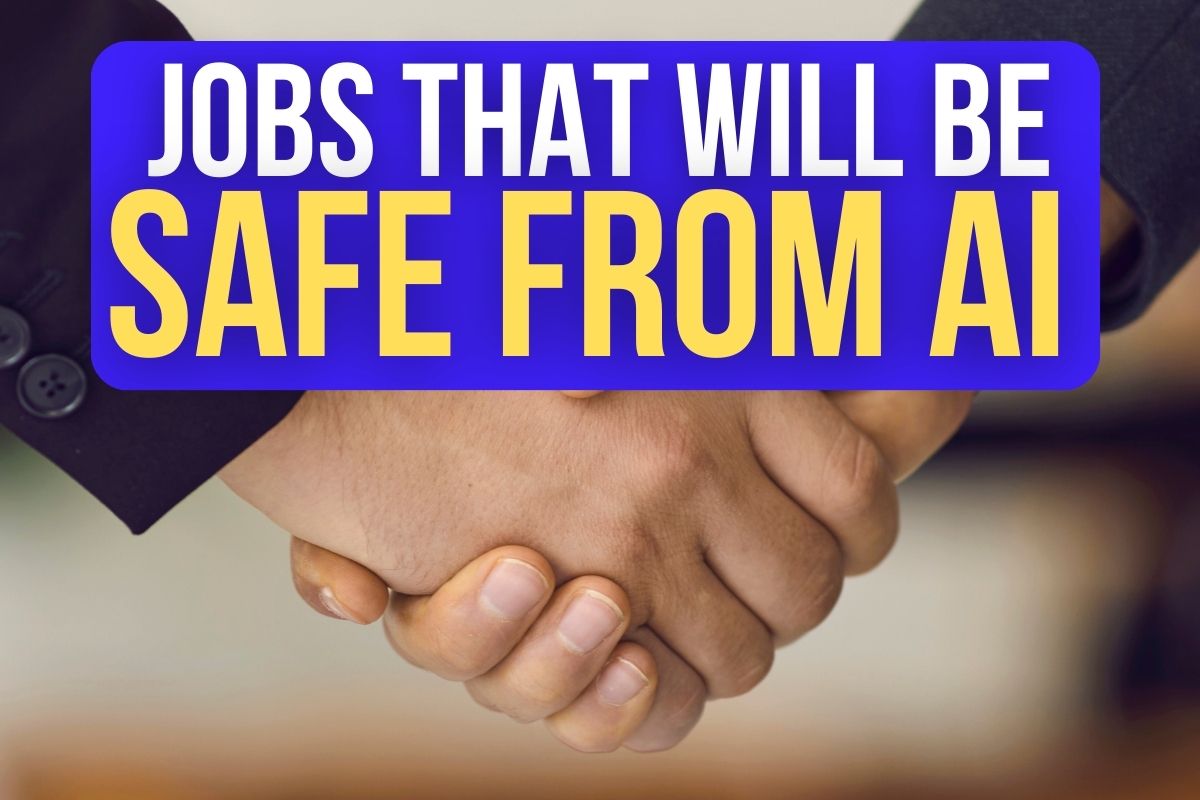27 Jobs That Will Be Safe from AI
The Misfit Teacher contains affiliate links which means that if you make a purchase using one of these links, I may receive compensation at no extra cost to you. Read my disclaimer for more information.
If you worry about all jobs on the earth disappearing due to AI, and a future where most people don’t have jobs – then you’re not alone.
Digging into how AI is changing pretty much any job on the planet can be an unsettling, depressing and scary experience.
For any job you type into Google, a popular query is “is it safe for ai?” Because everyone in every industry is wondering what the future looks like for their jobs.

That’s part of why I wrote this list of jobs that will remain safe. As someone who earns a living from writing and producing content, I know what it’s like to be in a line of work that’s been affected by (and even predicted to disappear) because of AI.
I love what I do, and I believe humans are happier and more fulfilled when they have a purpose.
So, I’ve come up with 25 jobs that are safe from AI. By safe, I mean:
- AI is unlikely to completely take over the job during our lifetime
- The job projections are showing that it is a growing career where humans will be needed in the next 5-10 years
So, here we are – 25 jobs that won’t be taken by AI anytime soon!
Jobs that Will Be Safe from AI
Jobs that are unlikely, or impossible to be taken by AI tend to fall in these main categories or skillsets:
- Emotional intelligence and empathy. Being able to empathize, understand and pick up on subtle cues will be a golden skill moving forward. Emotional intelligence is called EI and it’s now considered to be more important than IQ
- Healthcare, especially when it comes to obstetrics, nursing, and anything related to needing to examine, move, operate on, or feel organs in or on a human’s body. AI is nowhere near being able to take over these kinds of tasks
- Jobs that require human manual skill, such as paramedics, first responders, surgeons, and even technicians, are far from being replaced
Pro Tip: In addition, most unionized jobs have a certain protection that those of us who are self-employed don’t have because they negotiate contracts that keep their members employed
1. Reporter
The reason AI models know what’s going on in the world is from reading whats being written by humans online.
Being a reporter involves much more than writing, it’s also finding stories that would entice people want to read about, and finding good sources for those stories.
Read any newspaper about a current event or hot topic, and you will see the reporter’s name at the bottom. Subscribe to HARO, and you will see all the inquirees that reporters who work for big publications are making.
2. Therapists
Therapists of many kinds are jobs that are projected to grow significantly.
Art and music therapists are going to need humans, and there will continue to be people seeking out family, individual and marriage counsellors.
A therapy/counselling business does well everywhere – online, cities and small towns.
3. Event planner
Whether it’s wedding planning or large-scale corporate events, being an event planner involves taking a lot of very unique things into consideration, and no two events are the same.
While AI tools could be used in the process of planning an event, the job involves a lot of:
- communication with multiple people, vendors as well as clients
- scheduling, and ensuring calm flows and transitions between plans
- balancing budgets
- knowledge of the industry, current vendors and what they offer
4. Midwives, Obstetricians and Gynecologists
The science and art of caring for expectant moms and delivering their babies is safe. All jobs in this category are only expected to grow in the next 5-10 years.
5. Nurses (especially nurse practitioners)
Nursing positions are growing in need; especially practitioner nurse jobs are expected to double in numbers by the 2030s.
6. Physiotherapists
Physios (or physical therapists, depending on where you’re located) are having their jobs change with newly available AI tools, but those tools cannot replace their jobs anytime soon.
7. Photographer
Being a photographer, especially one who needs to capture real-life events and memories for people – will continue to be needed.
One aspect of photography that will be especially needed to be filled by humans is wedding and family photography – you need to be good with people, and make them comfortable, as well as adjust poses and positions.
Photoediting tools are becoming increasingly automated – but the actual being there in person to take the picture – is not.
8. Lawyers
There will be less work for lawyers in the future (fewer positions, and far more automation of lawyer-related tasks that typically used to keep new lawyers up all night) but there will always be some sort of law work required.
9. Customer service, client relations
Many aspects of customer service have been automated (we’ve all talked to a robot before we could reach a real human.) At some point though, there needs to be some humans working in customer service.
Customer service is more than just solving a problem that a customer has. It’s about validating them, and making them feel important to the company. Like their concerns and feelings matter. Filling all those roles with bots doesn’t say ‘we care about your satisfaction and user experience’ like humans can.
10. An electrician or plumber
You can’t get a robot to install plumbing or wire your house! We’re a long way from that being remotely possible for these kinds of jobs to be completely automated.
11. Housekeeping
Those who can afford the luxury of nannies, housekeepers, gardeners and landscapers will continue to hire humans for these positions. They will always exist to an extent.
12. Dog trainer, or groomer, or walker
Anything involving pets (especially dogs and cats) will continue to need humans. Domestic animals connect to humans, and they never would in the same way to a robot.
There will always be people who need help with training their pets, pet sitting, grooming, and of course vet care. And by the way, that’s a huge industry with a lot of income potential – in the US, $150 billion was spent on dogs alone in 2024.
13. Hairdressers and barbers
I don’t think anyone wants a robot touching their hair anytime soon. If you think back to the hairdressers or barbers that you kept going back to over the years -I’ll bet its often people whose personalities you enjoyed.
14. Childcare
It will be a long time before anyone feels comfortable leaving their kids with some sort of AI as a caregiver.
Caring for children involves being able to move around, possibly lift or help them if needed; not to mention good judgement making, empathy, and making good spur-of-the-moment decisons.
Even if down the line (several decades from now) publicly-funded institutions begin creating robots that can look after children – there will always be people who favour a human to raise, support and nurture humans.
Teaching in alternative education like Waldorf or Montessori are even more safe as human connection is embedded deeply in their values.
15. Chef or cook
Lots of moving parts; involves managing a kitchen as well as food prep. In addition, being a chef involves needing the ability to see well, smell and even taste. Chefs often may taste their food with a spoon during the cooking process to make adjustments. Since AI won’t likely ever have taste bugs, chef jobs should be safe for the foreseeable future.
16. Interior design and decorating
Interior design and decorating, like many arts – are both being impacted by AI (more so for decorators over designers.) Read about the difference between these two jobs here.
But both will still be needed, especially interior designers. Their job is a lot more specialized and requires them to think about space, functionality based on what’s in front of them, as well as permits, contractors and aesthetics on top of that.
17. Marketing
Really good marketing requires a deep understanding of people and lived experiences and how people really think. AI bots aren’t very good at that yet. Yes, they can help, and are certainly getting better at it. You may already see smaller, low-budget businesses trying to outsource their marketing to AI over paying a professional. But, businesses with a large budget generally want to pay professionals in marketing who have that deeper understanding of what people are thinking, and what will draw them in.
18. Teaching
Similar to childcare, there will always be a demand for in-person and even online teaching
Specifically, education jobs in teaching art, music and dance to secondary students are projected to grow, and so are kindergarten through grade school.
Pro Tip: Non-teaching jobs in education will remain safe too. We aren’t going to allow robots to decide what curriculums should focus on, what students should be learning, what will be useful to them in 20 years. See my list of education jobs that aren’t teaching here.
19. Tutor / Small lesson instructor
If you have a skill that you have qualifications in, you can build a whole career out of teaching it online or in person.
You could even supplement that income by creating and selling digital products, or teaching it to people via a YouTube channel. Look at all the people teaching us to do all kinds of things on YouTube. For some, its a partial income, but some are raking in enough to live off of.
Whether it’s teaching guitar or piano, swimming lessons, second language, cooking, baking, making charcuterie boards, or building something – there are people out there willing to spend money or their time to learn it from you.
Interesting fact: My husband has a YouTube channel teaching people how to put retro cames onto handheld devices.
A special note on online language teaching
I taught ESL online for many years, and I manage a Facebook group of over 1500 italki teachers – and many of them are worried about the fate of their jobs as AI bot tutors have become common.
However, as a language learner myself, I can tell you that those bots don’t offer the same experience as learning from a real human. Ultimately, I’m trying to improve my speaking skills while communicating with humans, not with robots. I want to know that a human will understand me in that language, and that I’ll be able to understand them when they talk. (Not just a robot who overannunciates.) Read my post on starting a tutoring business here.
20. Social services
A social work degree will always be useful and needed. It’s one of the most people-centred, empathy-based jobs out there.
Social workers are needed in schools, and homes and workplaces, and the job outlook is expected to steadily grow up to 10% annually into the early 2030s.
21. Police officer
Many aspects of police work can be improved and deepened with automations, such as speed cameras, for example.
But, there’s always going to need to be some human law enforcers. They drive around, keep their eyes on things, investigate situations, visit homes, and interact with many different people involved in a situation. They’re not going anywhere.
22. Entertainer
The entertainment industry is very broad. I’m talking about singers, dancers, actors, comedians, and even magicians.
Part of what we love about watching a musical, a ballet, or a circus is seeing how people can move their bodies in ways that amaze us. Even if robots could be made to do the same things, then the magic or mystery of it would be gone.
When it comes to actors, there will always be stage performers, and there is collective bargaining to protect creatives (including actors) in the Hollywood entertainment industry.
These kinds of jobs are not easy to get, and of course – you need to be good at them.
23. Firefighter
Until we have fully functioning humanoid robots who can run into buildings, saving people and targeting fires – we’re still going to need people to do this.
24. Esthetician
Anyone working in the beauty industry, in spas and salons, is safe for the time being. We trust our skin, tails and hair with a human who can see them – and see us.
25. Massage Therapist
Massage has always had some automated elements (massage chairs have existed since the 1950s) and now, there’s even more it can do; such as scheduling.
But massage therapy is one of the safest jobs from AI, and its projected to grow by 20%. Read more about AI and the massage therapy industry here.
26. National Park Ranger
National Parks will always need humans working at them. There are specific jobs that only a human can do; such as hike out to trails or summits to assess current safety conditions.
Sometimes this job is best for someone who cares about the environment. Ever seen trails closed because the ground needs a chance to recuperate from being over-walked on, or to allow plant life to revalitize? These decisions are made by humans; who can see and assess the conditions first hand, and often, care about the environment.
27. Authors and Writers
AI is now famous for its writing, so being a writer may come as a surprise to you.
However, keep in mind what I said before – the only reason AI has the content it does to generate from is what has already been written by humans.
Good writing involves a lot of empathy and understanding of how people think and what they’re looking for. You also have to know what is going on right now.
- Bloggers. Take my job for example (full-time travel blogger.) AI can plan trips, but unless it has visited the destination recently, it can’t possibly know how travel is changing. Same with cooking; it can’t cook or have experience tasting the food and serving it. It’s also never parented or raised a human. We’ll always need people to write about their real human experiences and expertise.
- Authors. People are writing and self-publishing books with AI, yes. But those books are nowhere near as good, and are not selling, like real authored ones are. If you have a story, you should write it anyway.
28. Speech and Language Pathologist
A person really needs to be sitting with a person (often a child) to help them with whatever speech skills they’re struggling with.
29. Scientist
Whenever you hear that ‘a study was done, or a study proved,’ who is facilitating those studies? Human scientists.
And similar to most jobs – while many parts of of scientific research and study can (and probably already is) automated, there always needs to be a human driving the experiment and study. They’re the ones who decide what should be studied, and now. A robot can’t possibly make deicions about what kind of scientific study is needed or relevant in our study completely on its own.
30. (Drumroll) CEO, business owner
So, here’s the thing – when people say “AI is taking jobs” that’s actually not accurate. AI is not taking jobs – people are, by choosing to use AI tools and automations instead of hiring people.
And who are those people? Usually the boss, CEO, or small business owner. Those are legitamite jobs to look into. Start your own business.
Interesting questions to ponder about this topic: Is it ultimately in the best interest of every business owner and CEO to replace people’s jobs with AI? If airlines replaced pilot and cabin crew with robots, and school boards decided to have robots created to teach classes rather than real people – then where does that leave them if people don’t have jobs? In a society where most people don’t have money because they can’t find jobs, are there enough people that can afford to book flights, buy products, use services?
How to Choose or Find Other Safe-From AI Jobs
Similar to back in the day, when people chose careers based on which would earn the highest salary, I would caution you from choosing a career simply because it’s on the ‘safe’ list above.
Instead, I want you to think first about what truly interests you. What kinds of things did you like doing as a child; what dreams have you neglected, or hobbies you don’t have time for anymore? See my resources here on finding meaningful work.
Now, more than ever, true interest and passion in your art or skill is what will be a game-changer in how anyone else (human or robot) can compete with you.
While researching which jobs are safe vs not safe, and how AI is changing jobs may seem like a good way to choose a job…. the reality is, the more you believe that AI is taking all sources of income, the harder it will be for you to find something you really enjoy.
I recommend reading some career change books, and money mindset books that will fill you with the hope and inspiration that will nudge you towards what you were really meant to be doing.
Brainstorming Exercise to Unlock MORE Jobs that are Safe from AI
Think of what you spend money on, and what products or services you consume. Where are humans needed in the process, and where are they not needed? If the jobs required for you to get your favourite foods/products/services could be completely taken over by robots, what would be different about it? Would the item or service be different in quality? What would people be willing to pay extra for to have it improved or enhanced by ‘real’ people? This is where the money is in the future.

Final Thoughts on Avoiding Jobs that Will Be Taken by AI
I hope that this article has comforted you in reading it, as much as it comforted me to write it. AI is changing the way we work, and it’s changing the world. But I believe that there will always be work and money out there for people who want it, and I believe that you can make a lot of money doing something that you have a special interest, talent or skill in.






